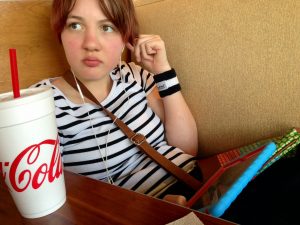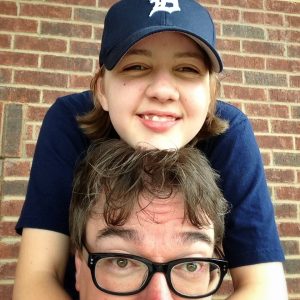BridgingApps is pleased to welcome Robert Rummel-Hudson as a guest blogger this month in honor of Father’s Day. Rob shares his thoughts on fatherhood from the perspective of a man who has a daughter with special needs and cannot speak. From the early days of learning to use PRC’s Vantageâ„¢ speech-output device to his daughter’s success with using an iPad Mini for communication, their shared journey through the world of Assistive Technology has been fraught with frustration, discovery, confusion, and hope–not necessarily in that order.
Unseen Giants
by Robert Rummel-Hudson
 I once wrote a piece that imagined a conversation (over a game of poker, of course) between a group of mythological creatures, beings whose very existence was rumored but not proven. Present at this poker game were the Yeti, Bigfoot, and the Loch Ness Monster. The fourth slot was usually filled by Chupacabra, but he was in rehab, so a replacement player took his place.
I once wrote a piece that imagined a conversation (over a game of poker, of course) between a group of mythological creatures, beings whose very existence was rumored but not proven. Present at this poker game were the Yeti, Bigfoot, and the Loch Ness Monster. The fourth slot was usually filled by Chupacabra, but he was in rehab, so a replacement player took his place.
That player was the Involved Special Needs Father. I guess I could have also made him the Invisible Man, if I’d been a little more Johnny-on-the-Spot.
I was being cute, or at least trying to. The point, however, was one that has been a little sticky for me ever since my daughter was diagnosed with a rare brain malformation called Bilateral Perisylvian Polymicrogyria almost eleven years ago. It comes up every time I show up to an IEP meeting and am met with mild surprise or curiosity, even though I’ve never missed a parent/teacher meeting, ever. I’ve felt it every time a teacher has given me paperwork “to take home to Mom”. The point comes home when I’m invited to write for an online disability publication, only to find that the site in question is targeted to special needs moms. For that matter, it comes up every time I see an article singing the praises or detailing the hard work or the peculiarities of the daily parenting life of special needs moms. This is particularly tweaking when (as is almost always the case) the particulars of the article refer to things both large and small that arise in the lives of special needs fathers, too.
Bigfoot gets blurry photos and his own show on Animal Planet. Special needs fathers have to work a little harder for acknowledgment, and we’re not even trying to hide in the woods.
And the thing is, it’s fine. I know a lot of fathers of kids with disabilities, and they are some of the hardest working individuals I’ve ever known. They are also some of the most well-informed, which is crucial for special needs parents. The special needs dads I’ve met over the years have been some of the most impressive people I could ever hope to know, and aside from needy loudmouths like myself, they do so with quiet dignity.

They don’t need affirmation or public accolades. They only need the love of their children, and the occasional sense that the good work they do for their kids is paying off in some way. They just need to feel that they matter.
Sometimes I think that’s trickier than it sounds. I’m not sure if it’s something that’s hard-wired into fathers; I suspect it has more to do with the societal narrative we’ve all grown up with in some way. It’s the one that says that mothers nurture, and fathers fix. And I can tell you that no matter how progressive you are or how successfully you strive to build your own narrative, that narrative takes hold in subtle ways.
For a father of a child with special needs, letting go of the idea that you can somehow fix what’s impaired in your child, that you can make the world treat them with fairness and compassion, that can be difficult. I can’t tell you how to do it, because honestly, after all these years, I have no idea.
What I can tell you is that after a while, if we’re paying attention, special needs fathers learn something. We learn that our kids are who they are, and their disabilities may need to be accommodated but they don’t need to be fixed. They’re part of the complicated and wonderful puzzle that makes up our children.
If you asked me that oft-repeated but generally useless question, whether or not I’d take my daughter’s disability away from her if i could, I won’t lie to you. My answer now, as always, would be yes, without hesitation.
 Should we want to take away our child’s disabling condition? It’s a hotly contested question, but it misses the point. The thing we come to learn as special needs fathers is that it doesn’t actually matter how we answer. No one is ever going to ask that question as the prelude to a miracle.
Should we want to take away our child’s disabling condition? It’s a hotly contested question, but it misses the point. The thing we come to learn as special needs fathers is that it doesn’t actually matter how we answer. No one is ever going to ask that question as the prelude to a miracle.
We can’t fix, but we can see. We can look and really see our kids, and come to understand that their disabilities are a part of their construction, threads that run deep and true in their tapestry. We become caregivers, and we become champions. We learn to fight and we learn to nurture, in ways that the fathers of typical kids might never have to do. We don’t allow ourselves to become Homer Simpson because our worlds won’t work with that character.
Today, on Father’s Day, I want to reach out to my fellow special needs dads, and I just want to congratulate them on the work they do. The next time they see an article on Facebook about the amazing things that special needs mothers accomplish in the world, I hope they’ll nod and salute those amazing women, but with the silent acknowledgment that yeah, they’re doing that work, too.
Most of all, I hope they remember that to their kids, they are giants standing astride the earth.
That’s enough. That’s much more than enough.
Robert Rummel-Hudson’s memoir, Schuyler’s Monster: A Father’s Journey with His Wordless Daughter, tells the story of raising a little girl with a disability and learning to become the father she needs. It was published in February 2008 by St. Martin’s Press.  For more observations on his life with his daughter Schuyler, please visit www.rummelhudon.com or follow his blog http://www.schuylersmonsterblog.com/.


My favorite part: \”We can’t fix, but we can see. We can look and really see our kids, and come to understand that their disabilities are a part of their construction, threads that run deep and true in their tapestry. We become caregivers, and we become champions. We learn to fight and we learn to nurture, in ways that the fathers of typical kids might never have to do. We don’t allow ourselves to become Homer Simpson because our worlds won’t work with that character…\” That is great stuff…. especially that last sentence. Awesomeness.